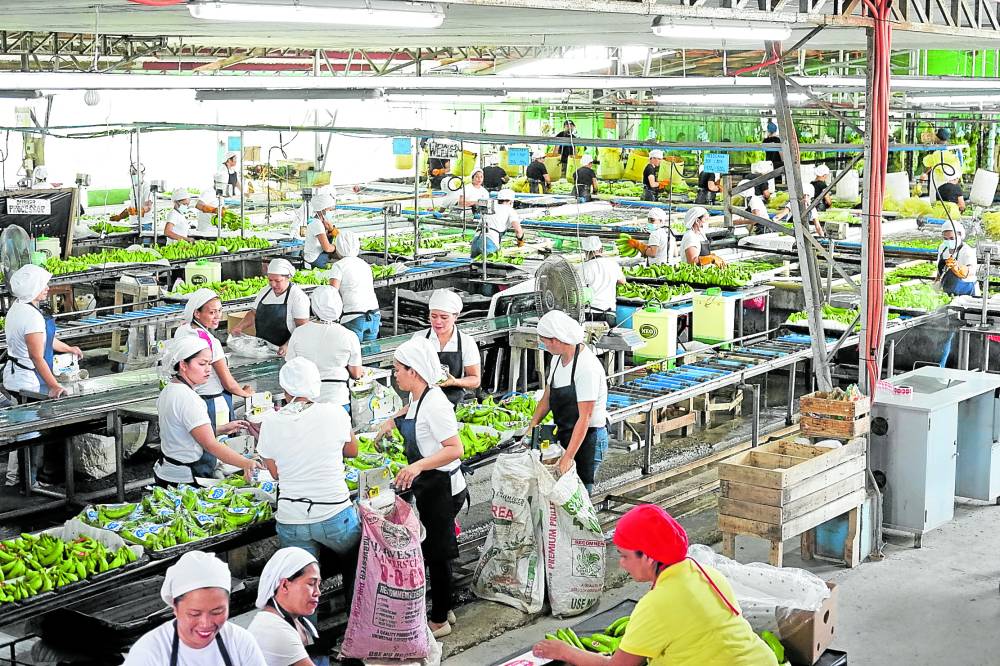In Mindanao, strong dollar not all gainful for banana exporters

EXPORT-BOUND Workers classify Cavendish bananas for export in a packing plant of Marsman Drysdale Agricultural Group in Davao del Norte in this photo taken before the pandemic. The factory is vibrant again as the country’s traditional export markets for the fruit fully reopen. —PHOTO COURTESY OF MARSMAN DRYSDALE AGRICULTURAL GROUP
DAVAO CITY—Banana exporters in the country, who are mostly based in Mindanao, find that a strong US dollar is not all good for their industry.
While a weak peso increases the exporters’ dollar-denominated revenues, this also drives up the cost of petrol-based fertilizers, which was aggravated by the skyrocketing price of oil due to the ongoing crisis in Ukraine, said Alberto Bacani, president of Pilipino Banana Growers and Exporters Association (PBGEA).
The peso stood at P58.95 to a US dollar on Friday. It was P50.688 a year ago.
Early this year, PBGEA, which groups the 18 biggest banana companies in the country, successfully campaigned to have Japanese consumers pay more for the bananas they eat on account of the rising cost of producing the fruit.
As a result, the exporters got a 30-yen increase per kilogram in the price of their bananas, from 248 yen to 278 yen. This translates to a hike of $2.50 per box.
Article continues after this advertisementStiff competition
However, the increase was somehow balanced off by the weakness of the Japanese currency, said Bacani, the president of Unifrutti Tropical Philippines Inc., a Davao City-based banana farming and trading company.
Article continues after this advertisementThe yen stood at 147.25 to a dollar on Thursday, up by more than 16 percent from its value of 126.56 six months ago.
The country’s banana exporters corner 75 percent of the Japanese market.
Bacani said they were exerting all efforts to keep their dominance in the Japanese market as Philippine bananas were losing ground in other lucrative markets.
One was their lobby to bring down the tariff on imported Philippine bananas, he said.
In China, the share of Philippine exporters went down from 80 percent to only 36 percent in the last five years, as Chinese importers prefer to source their supply from cheaper imports in Laos, Cambodia and Vietnam, Bacani said.
In South Korea, Bacani said Philippine suppliers still control some 70 percent of the market, although this was down from 95 percent a decade ago.
The market share of Filipino exporters was eaten away by Latin American suppliers, which enjoy zero tariff while those from the Philippines were slapped with 30-percent import tax.
Declining production
According to Bacani, the country’s banana export woes are rooted in the industry’s declining production.
The country currently produces an average of 140 million boxes a year, down from 160 million boxes in the last two years. Of these, 40 percent goes to Japan and 25 percent to China.
The reduced production capacity is blamed on shrinking production area, which went down to 50,000 hectares from about 85,000 ha a decade ago.
The decline started in the aftermath of Typhoon “Pablo” (international name: Bopha) in 2012, as the floods it brought caused the spread of Fusarium wilt, also known as Panama disease, to a vast expanse of banana farms in the Davao region.
“[Today] there are a lot of abandoned farms,” said Bacani.
Bacani said there were efforts to recover the infected areas. But some other companies have decided to invest in other countries because of the high cost of production here as well as the advantage of being near the big buyers. INQ